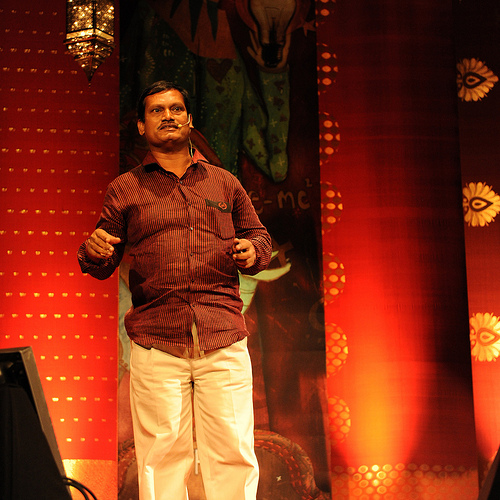[ted id=1614 width=560 height=315]
2012 was the year of radical openness at TED. In that spirit, while our office is closed for winter break, TED’s editorial staffers have selected their favorite talks of the year … giving you a peek into both our process and our personalities. We hope you enjoy.
I’m impressed and intimidated by people who can give a TED Talk in more than one language. So let me start by saying: Arunachalam Muruganantham speaks much better English than I do Tamil. He even cracks jokes in English — really funny jokes. Respect.
Muruganantham is an inventor from Tamil Nadu who started a business making something he knew nothing about: maxipads. It’s a painfully intriguing topic — of regular interest to some of us, it makes others squirm in their chairs. (And given the number of people on Earth who have periods, compared to the number who have, say, robotic prosthetic arms, it’s actually strange we hadn’t yet seen a great talk on the subject. Believe me, we are looking for more.) When Muruganantham saw that his wife had a problem affording sanitary supplies, he worked for years to design and (here it comes…) test an effective and cheap maxipad. He then built a philanthropically oriented business helping women’s groups around India make and sell their own pads.
So: a topic we’re squeamishly passionate about, a social message worth hearing, gorgeous footage, and a warm and laughing audience in the theater at TED@Bangalore. There’s just one thing standing between this talk and the TED front page, and it’s a tough question to think about: Some of the words that Muruganantham speaks are hard for our wider audience to understand.
Understanding is something we take really seriously. When TED first started posting videos online in 2006, we didn’t yet have transcripts or translations. And we started right away to get emails from people in the hearing-impaired community, as well as from those who did not speak English. Both of them said the same thing, and I’ll never forget hearing it: You’re sharing these ideas with everyone but me. Transcribing all our talks, and building the Open Translation Project, were driven by the desire to fix that. Now, below the window of every TED Talk is a button to turn on a transcript in English or any language it’s translated into.
So we decided, for Muruganantham’s talk, to build a text transcript and have it pop up automatically when you visit his TED Talk. It took a surprising number of people to make this simple thing happen.
First, the transcripts themselves, which happen at top speed. TED staffers Thu-Huong Ha and Morton Bast work together with a professional transcriber to attach time-coded text to the edited video. It’s doubly important to get these texts exactly right, both for our users who choose subtitles and because the English text is used as a basis for translations in 94 languages. Something like 35,000 separate text files depend on these English texts to be correct.
Then, the default behavior of our subtitles is to disappear until needed. So the transcript team had to work with our engineers to make sure that on this particular talk, the the subtitles would pop up automatically. While we’ve placed auto subtitles on talks given in French and Spanish, making it work in English took a little tweaking. Thanks, engine room!
To get around the issue, our video editor Laurie House tried a quick experiment with burning subtitles into the talk video itself — instead of using a separate layer — but quickly realized that once the talk was translated, the new language would want to go right where the English titles were burned in. So, scrap that.
Meanwhile we’ve got three people working on this transcript over the weekend, checking the text phrase by phrase into our subtitling back-end software. And they’re making a lot of headway. But on the Monday the talk is scheduled to run, just hours before we post it at 11am, we still have seven “[unclear]”s. In other words, seven places where the speaker mumbles, or makes a reference we can’t catch, or is drowned out by laughter. We’ve never gone live with this many “[unclear]”s, but we can’t just guess at what Muruganantham is saying. So at 9:30am, we socialize the problem, sending an email to everyone and anyone who might have insight on the talk.
At 9:40am, Jenny Zurawell, our Open Translation Project coordinator, takes a pass (she speaks four or five languages herself) and clears up three of the missing words.
At 9:48am, Lakshmi Pratury, the host of TED@Bangalore, weighs in from India with the rest of the four words, and a major correction we’d all missed:
At three minutes in, the transcript reads “that is why I am jealous of science in India”. ‘Science’ is not what Muruganantham said. He said ‘Saints.’ The sentence should read “…jealous of saints in India”.
And just before post, we hear from Muruganantham himself, who confirms Lakshmi and Jenny’s readings, and says:
“further any doubts, i can clear it.”
We post the talk, and — well, what we expect to happen happens. There are those few folks who won’t ever watch a talk about maxipads and lady problems. There are those few folks who get frustrated by someone who can’t speak perfectly crisp English. But most people watch the talk, read the subs, and fall in love with this beautiful guy, who just wanted to solve his wife’s monthly problem, and then found a way to help a nation full of women too.
As Rebecca Eisenberg wrote when Upworthy featured the talk on Facebook: “It must have been this guy’s time of the month to be awesome.”

Arunachalam Muruganantham at TED@Bangalore, part of the TED2013 Talent Search. Learn more at http://talentsearch.ted.com. Photo courtesy TED@Bangalore.
Comments (7)